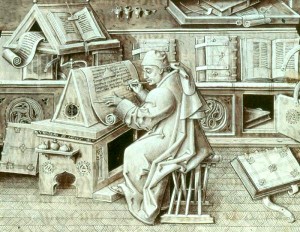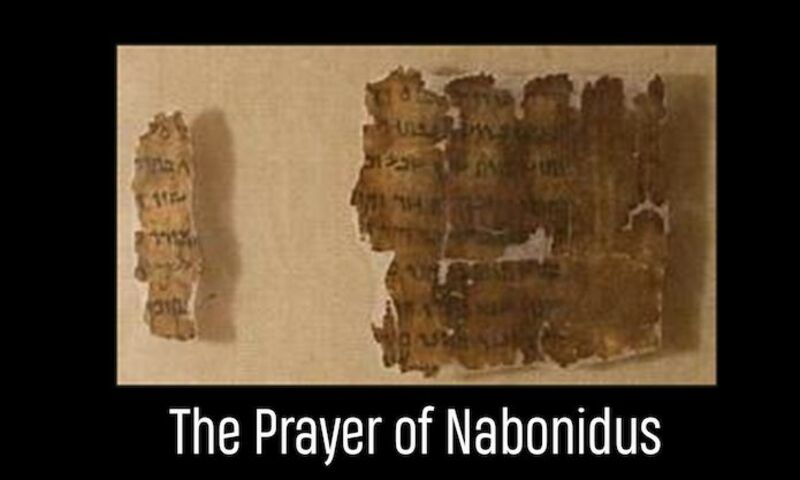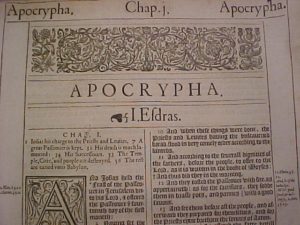
Where did the Old Testament canon of books come from? The term “canon” is used to describe the list of books approved for inclusion in the Bible. It stems from a Greek word meaning “rod,” as in a straight stick that serves as a standard for measuring. Hence, to speak of the biblical canon is to speak of authoritative books, given by God, the teachings of which define correct belief and practice. Obviously, only books inspired by God should be received as canonical. The Bible before you includes 39 books in the Old Testament (OT). Are these the right books? Who wrote them? What were their sources of information? These questions are asked by friends and foes of biblical faith. ThIs article touches on such issues with an aim to bolster confidence in the Old Testament Canon of books as the “inspired” “word of God” (1 Thessalonians 2:13 NLT; 2 Timothy 3:16 NLT).
Sources for the Earliest Histories of the Old Testament Canon of Books
Genesis chapters 1-11 are referred to as “primeval history” because they cover events that occurred far back in the shadows of earliest time. Genesis chapters 12-50 are in turn called “patriarchal history” since they recount the lives of Israel’s founding fathers from Abraham down to Joseph. From the creation of the world to Joseph’s establishment in Egypt, all the events retold in Genesis occurred long before Moses was born. This is significant because the Bible and long-standing Jewish tradition assert that Moses wrote the first five books of the Bible (the Pentateuch). Most likely he composed them between 1the late 1500’s and early 1400’s BCE, while he and the Israelites traveled outside of Canaan. Many events in Exodus through Deuteronomy coincided with Moses’ lifetime, and so he authored these largely as an eyewitness. But what about Genesis? How did Moses know details about events and people that preceded him by many centuries?
Some suggest Moses knew the ancient histories because God revealed them to him supernaturally. In this scenario, God’s inspiration of Moses would include God supplying Moses with historical details about far gone people, places, times, and even conversations—information Moses would not have known had God not told him. This possibility cannot be ruled out in principle since God is capable of working such miracles, but careful analysis reveals the Pentateuch nowhere hints that the historical narratives were given to Moses in this manner. For instance, Genesis never says anything like, “The word of the Lord came to Moses, saying, ‘This is the history of Abraham.'” Instead, the Genesis narratives about Abraham and other historical figures read like straightforward accounts that have been handed down in the usual way: through oral and written records, with the oral records presumably originating soon after the events occurred. In this case, we would add that God superintended the transmission of the early oral and written accounts so that Moses received reliable histories worthy of inclusion in Genesis.
That Moses possibly used such sources may seem surprising at first. People often assume the Bible is the product of divine dictation, but it is more accurate to view Bible composition as having involved both supernatural and natural means, with the result that the original Bible manuscripts were fully reliable and stemmed simultaneously from divine inspiration as well as regular human approaches to writing. This model is supported by Luke 1:1-4, where Luke says he did a lot of research before writing his Gospel. A similar example is found in Numbers 21:14, where a quote is lifted from the now lost “Book of the Lord’s Wars.” From these examples we see that Bible writers were free to draw reliable historical data from non-biblical sources. Thus it seems Moses was able to write about historical events that occurred long before his birth by drawing upon information found in pre-existing sources, all while God’s Spirit inspired him in penning Genesis.
How did these written sources come down to Moses? For the primeval history, it is reasonable to suggest that from earliest times people passed down carefully preserved oral accounts about key events and significant persons. Later, when elementary writing arose, many of these would have been committed to writing. The transfer to written format may have happened earlier than is commonly supposed. Rudimentary alphabets are known to have circulated in the early second millennium b.c., and with the discovery of the Palermo Stone we have solid evidence that the Egyptians wrote detailed historical records (in hieroglyphic text) at least as far back as 2600 BCE, a time that predated Moses by over 1,100 years. The rich details inscribed on the Palermo Stone reach back toward the very dawn of Egypt, naming kings from 3100 BCE and even earlier. In light of this example it is fitting to suppose that key remembrances of early human history were preserved and passed down to later generations.
That the very earliest writings have not survived to our day is no surprise, for they would have been rare to begin with and would have perished long ago as the acids of time worked their destruction. But they survived long enough to bequeath vital facts to later societies who learned to write the histories in more permanent formats. Some of the greatest modern archeological digs have uncovered ancient nonbiblical texts that resemble the biblical accounts of Noah’s flood and the Tower of Babel. These texts date from 1600 BCE and earlier, and in broad strokes they corroborate Genesis. Their points of departure from Genesis may reflect corruptions that slipped in as cultures pulled farther and farther away from knowledge of God. By contrast, people who kept alive a faith like Noah’s preserved the stories uncorrupted, and it is these accounts that came down to men like Moses in later generations.
As for the patriarchal histories, it goes without saying that men such as Abraham would pass down close accounts of their remarkable experiences with God. Once God interrupted Abraham’s life and promised to create a nation through him, he knew his life was unique. This heritage was repeatedly confirmed to his descendants as God kept up His habit of revealing Himself and confirming His covenant of blessing. Somewhere down the line Abraham’s descendants began writing down these stories. This may have begun most earnestly with Joseph, the son of Israel who became a great political figure in Egypt. Writing was a very old art in Egypt by the time Joseph ascended to power. Having achieved a royal-like status and having married a well-placed Egyptian, Joseph and his family would have had every opportunity to learn the Egyptian writing craft. As a chief bearer of Abraham’s lineage, Joseph would have been keen to preserve the family traditions and the link to the one true God.
In the years after Joseph’s death, the Hebrews grew in number but came to be suppressed by the Egyptians. This suppression highlighted the need to preserve the histories. One theory holds that one of the Israelite families, possibly the Levites, became the official preservers of the old stories. If so, these materials would have been available to Moses (a Levite) when he became leader of the Hebrews. This inheritance, plus God’s commission of Moses and the fact that he was raised and educated in Pharaoh’s household, put Moses in a fine position to write an early history of humankind from the Hebrew perspective. A possible exception would be the portions of the creation accounts (Genesis 1-2) that could not stem from human eyewitness testimony. These accounts bear close resemblance to visionary revelations that were later given to prophets such as Isaiah and Ezekiel, as well as John in the book of Revelation. Hence, it is plausible to suggest that God gave Moses a revelatory vision for the first two chapters of Genesis. But in his writings generally, whether he was making use of oral accounts, written histories, or relying on God’s Spirit for the unveiling of the creation accounts, Moses often wrote more than he knew. In other words, Moses could not plumb the depths of everything he wrote, for an Author greater than he breathed profundity and prophecy into the works of his pen.
Who Wrote the Books and When?
The Old Testament canon of books do not have copyright dates on them, and few of them explicitly identify their author. Nevertheless, by aid of biblical testimony and Jewish history we know the approximate time at which the books were composed. We also know in many cases who the author was, or who was likely to have been, chiefly responsible for a book’s content. For thousands of years now scholarly people of faith have studied the matter and have concluded that the Old Testament Canon of books and their earliest recipients have reliably portrayed the authorship and dates for the sacred writings, yet today critics say the Old Testament canon books were written many hundreds of years after the dates and authors traditionally assigned to them. For instance, it is claimed that the Pentateuch was actually written nearly 1,000 years after Moses. In its extreme version, this theory even says men such as Moses and Abraham never existed; they and their histories were allegedly invented by priests who sought to provide hope-inspiring stories during the tough years when the Hebrews were exiled in Babylon in the sixth century BCE.
Such theories are chiefly built on the slim supports of (1) skepticism, which presupposes that God does not exist and/or that the Bible is just a human book, and (2) the occasional anachronisms scattered throughout the early portions of the Old Testament Canon of books. Skepticism is itself a faith of sorts, for the assertions that God does not exist, or did not inspire the Bible if He does exist, cannot be proven from the data at hand. Ironically, skeptics, who insist we should form beliefs only on the basis of evidence, contradict their own mantra. But what about the anachronisms found in the Old Testament canon of books? It is true that the Pentateuch occasionally includes such things as place names or vocabulary that did not belong to the era described. In other words, some of these only came into usage hundreds of years after men like Abraham died. Skeptics take this as proof that the books (and all the stories they contain) originated much later than popularly believed, and that the priests who invented these stories occasionally slipped up and placed contemporary names and words into ancient settings.
But this radical theory is firmly against the evidence. In reality, the early Old Testament canon books consistently bear the mark of ancient contexts—contexts that suit times long before national Israel arose. For instance, the laws, customs, and political situations described in the Pentateuch fit very naturally with the second millennium b.c. and earlier. This is proven by the discovery of many nonbiblical texts and artifacts from that era. It is unlikely that unethical priests a thousand years or more removed from the historical situations described in the Pentateuch could have gotten things so right. Also, the concerns that dominated the Hebrew mindset during the Babylonian exile are not addressed by the Pentateuch. Hence, how could priests hope to encourage their downtrodden fellow Hebrews in Babylon by inventing stories that bore no semblance to their situation? Further, it is unimaginable that the mass of Hebrews would fall for such a ruse, choose to base their entire worldview on false histories passed off on them by a band of inventive clergymen, and then succeed in selling the hoax to their children for generations to come. So what should we conclude about the anachronisms? Simply this: in the years after the Pentateuch was written, inevitable changes in place names, vocabulary, and political situations made these Old Testament canon books harder to comprehend. To alleviate this problem, priestly guardians of the sacred oracles updated the texts at key junctures to reflect contemporary word usage and geopolitical situations. Such changes as these (e.g.,
Judges 1:10; 1 Samuel 9:9) read more


